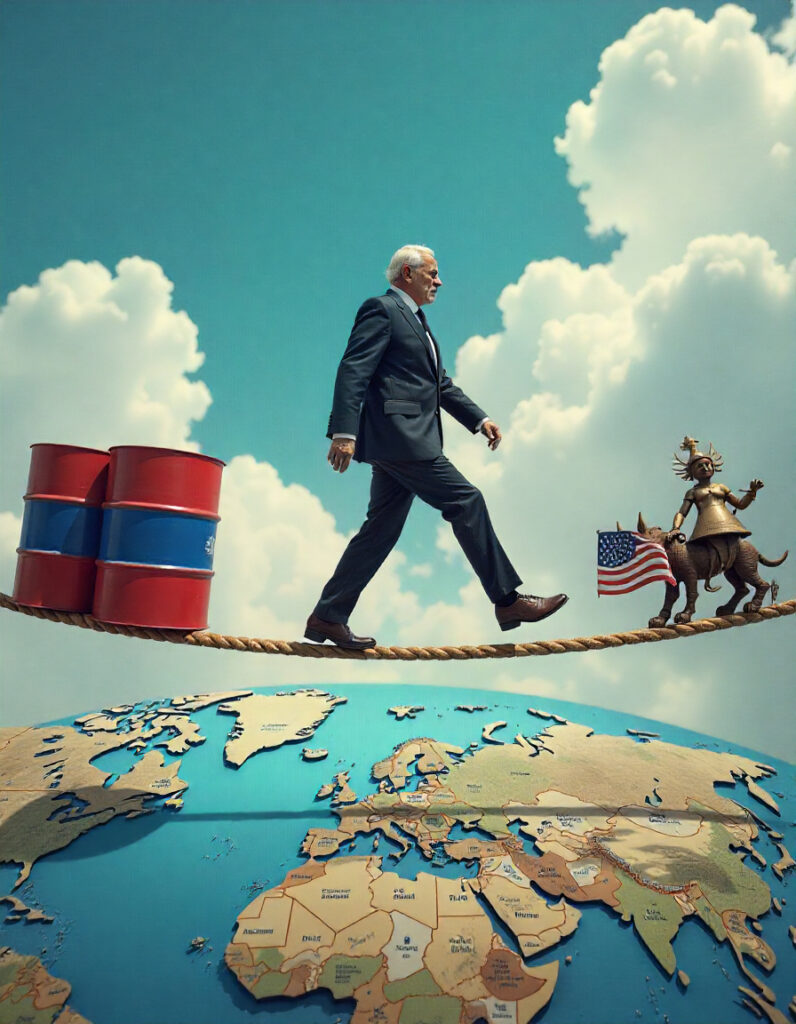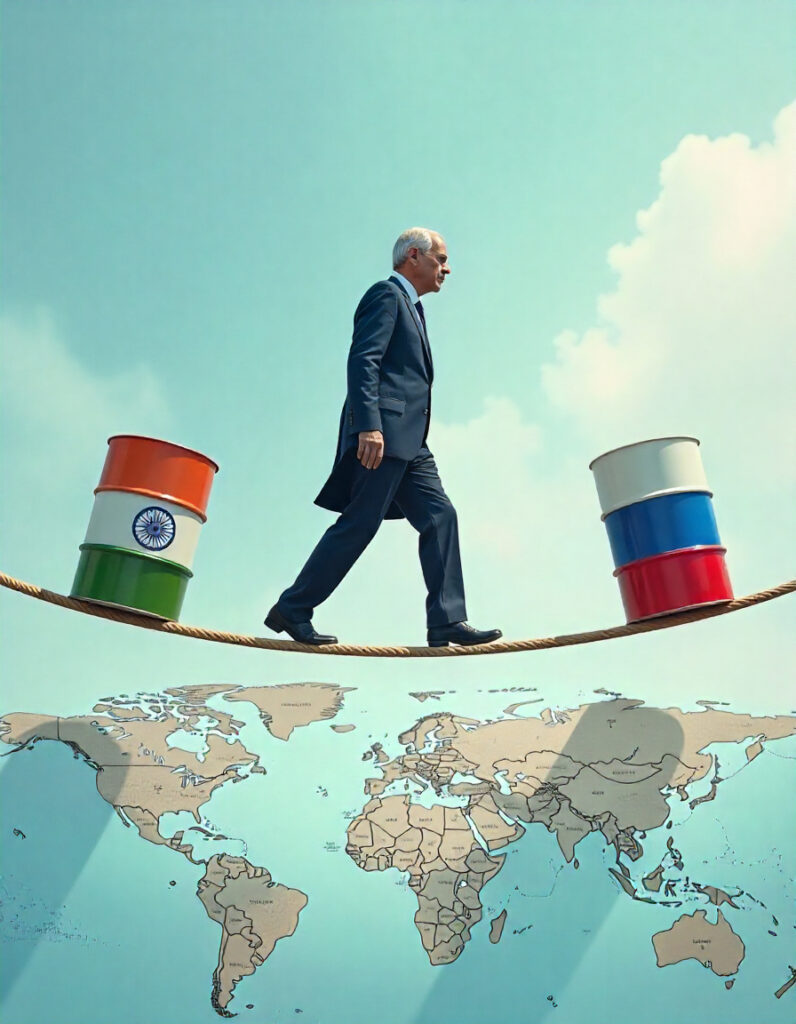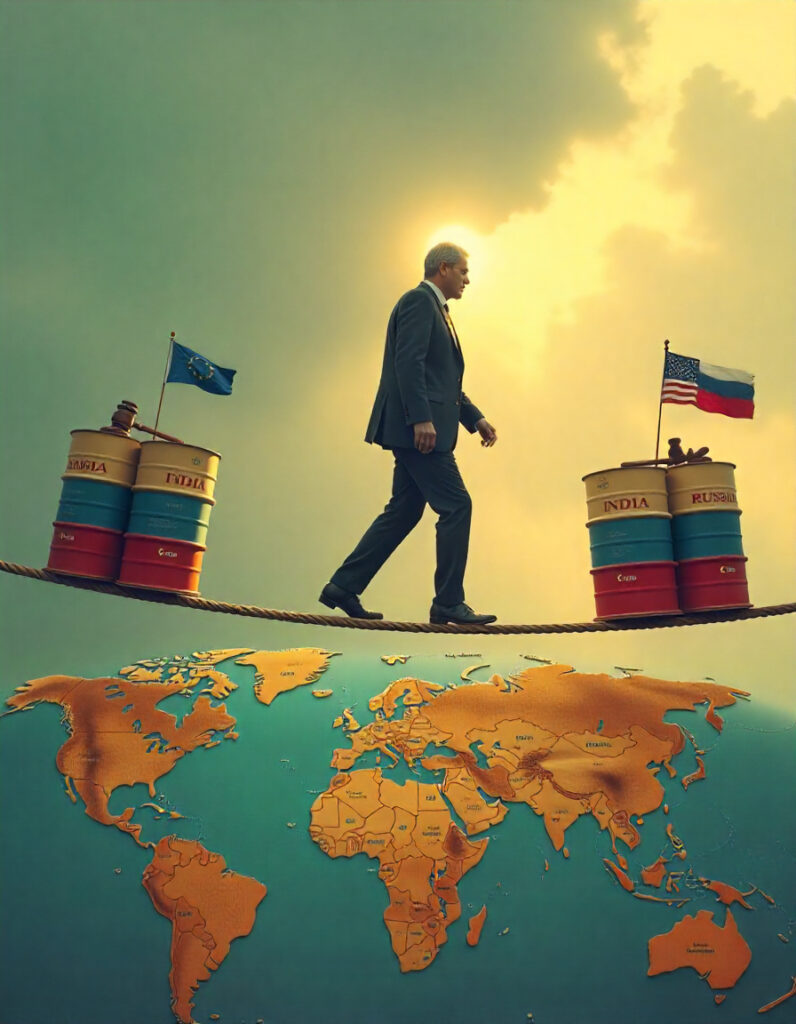India may shift its energy and trade policy in response to US tariffs and EU sanctions on Russian oil. Explore how the MEA plans to navigate this diplomatic and economic challenge in 2025.
Introduction: The Global Energy Chessboard in 2025

In a rapidly evolving geopolitical climate, India finds itself at the heart of a complex oil diplomacy puzzle. Recent statements by the Ministry of External Affairs (MEA) suggest that India may be reconsidering its approach to energy trade in light of mounting pressure from the United States and the European Union over continued imports of discounted Russian crude.
As the West enforces stricter sanctions against Russia due to the ongoing Ukraine conflict, India is under scrutiny for maintaining energy ties with Moscow. The implications are far-reaching—not just for India’s foreign relations but also for its domestic economy, inflation, and long-term energy strategy.
1. Background: How Did India Get Here?
India-Russia Energy Ties
Following the outbreak of the Russia-Ukraine war in 2022, Western nations, particularly the U.S. and E.U., sought to isolate Russia economically. However, India, like China, continued to import Russian crude oil at discounted rates. This was not only strategic but essential for India’s energy security and to keep inflation in check.
Between 2022 and 2024, India became one of the largest buyers of Russian oil, benefiting from prices below the G7-imposed price cap of $60 per barrel. These imports were often paid for in Indian Rupees or through bilateral agreements, circumventing the SWIFT system in many cases.
Rising Pressure from the West
Fast forward to mid-2025, and India is facing stronger pressure than ever. The United States, under the Trump administration, has re-imposed steep tariffs on Indian exports and has signaled further penalties if India doesn’t align its policy with Western sanctions. Simultaneously, the European Union has implemented a new wave of sanctions aimed at curbing third-party trade channels used for Russian oil.
2. MEA’s Latest Statement: A Shift in Tone
India’s Ministry of External Affairs recently released a statement that is being interpreted as a significant shift. While India has consistently defended its oil trade with Russia as essential for economic stability, the tone has now evolved to one of cautious pragmatism.
Key Takeaways from the MEA Statement:
- India is reviewing its energy procurement strategy.
- The government emphasized that all purchases are in line with national interest and global norms.
- India reiterated its commitment to peace and dialogue, without condemning Russia outright.
- It hinted at diversifying energy sources, possibly increasing reliance on Middle Eastern and U.S. crude suppliers.
3. Economic Implications of US Tariffs
Immediate Impact
The U.S. administration has already reinstated 25% tariffs on Indian aluminum and steel exports. There’s a looming threat of additional tariffs on pharmaceuticals, textiles, and IT services—a move that could impact billions in bilateral trade.
India’s Retaliatory Measures
India has not yet retaliated but is reportedly considering:
- Levying duties on U.S. agricultural products.
- Curtailing defense procurement talks.
- Pushing for rupee-based oil trade with new partners.
Impact on Indian Industries
- Textiles: High U.S. tariffs could reduce competitiveness of Indian garments.
- IT Services: If visa norms tighten again, India’s outsourcing industry will feel the pinch.
- Oil and Gas: Higher import costs may lead to fuel price hikes at home.

4. EU Sanctions and India’s Tightrope Walk
Sanctions Targeting Shadow Trade
The E.U. has targeted shipping companies, banks, and intermediaries facilitating Russian oil trade via third countries. India-based firms are under scrutiny for routing purchases through UAE or Singapore.
India’s Response
The Indian government has emphasized that all deals are legally compliant and transparent. However, to avoid diplomatic fallout, India may:
- Limit public disclosures about import volumes.
- Enhance bilateral deals with non-sanctioning countries.
- Invest in domestic refining capacity and strategic reserves.
5. Geopolitical Considerations
India’s Strategic Autonomy
India has long championed its “strategic autonomy”—the ability to pursue independent foreign policy decisions. Whether it was refusing to join Western sanctions in 2022 or buying Russian S-400 missile systems despite U.S. opposition, India has signaled that it will not be arm-twisted.
The Quad & BRICS Balancing Act
India is a member of both the Quad alliance (with U.S., Japan, Australia) and BRICS (with Russia, China, Brazil, South Africa). This dual role requires delicate balancing.
Reducing Russian oil purchases might appease the West but could weaken India’s BRICS influence. Conversely, defying the U.S. may jeopardize strategic tech partnerships, arms deals, and trade benefits.
6. India’s Energy Diversification Strategy
In light of the sanctions, India is likely to accelerate energy diversification:
Key Alternatives:
- Middle East: Saudi Arabia and the UAE remain top partners.
- U.S. Oil Imports: Though expensive, they align with diplomatic interests.
- Green Energy: India aims to achieve 50% of its energy from renewables by 2030.
Policy Initiatives:
- Increased investment in solar and wind farms.
- Boosting Ethanol blending programs.
- Encouraging EV infrastructure and public transport to reduce fossil fuel reliance.
7. Domestic Political Reaction
The MEA’s statement has triggered debates within India’s political and economic circles.
Opposition’s Critique:
- Accuses the government of bending under Western pressure.
- Warns that shifting away from Russian oil could raise fuel prices.
Business Lobby’s View:
- Calls for urgent clarity to avoid market volatility.
- Demands government support for impacted sectors like textiles and manufacturing.
8. Global Market Impact
India is the world’s third-largest oil importer. Any change in its energy sourcing can influence global prices.
Scenarios:
- If India reduces Russian oil imports: Global oil prices could rise due to constrained supply.
- If India maintains current imports: Western sanctions could expand, affecting shipping, insurance, and payment systems.
9. What Lies Ahead: India’s Diplomatic Options
India has several options:
- Continue Current Path
Absorb Western pressure, diversify where possible, and negotiate backchannel deals. - Gradual Shift
Slowly reduce dependence on Russian oil while increasing imports from U.S. and Middle East. - Policy Pivot
Announce a full policy shift to align with Western allies, though this is politically unlikely.

10. Conclusion: A Defining Moment for Indian Foreign Policy
India stands at a strategic crossroad. The MEA’s nuanced statement shows an attempt to buy time, manage relationships, and prepare for policy recalibration if needed.
In today’s interconnected world, India cannot afford to isolate itself economically or diplomatically. But it also cannot compromise its energy security or economic stability. As the West tightens the sanctions web and global markets respond with volatility, India’s next moves will be closely watched.
Whether India shifts its tack or holds its ground, one thing is certain—the age of non-aligned strategic ambiguity is giving way to a more complex world order where even old friends may turn into tough negotiators.
FAQs
Q1: Why is India under pressure to stop buying Russian oil?
Due to Western sanctions over the Ukraine conflict, the U.S. and E.U. expect global allies to isolate Russia economically.
Q2: What are the consequences if India doesn’t comply?
Higher tariffs, reduced trade preferences, and possible financial restrictions from Western powers.
Q3: Is India violating any international law?
No. India’s oil imports are within the legal bounds of current international trade laws.
Q4: Will fuel prices in India increase?
If India is forced to shift from discounted Russian oil to expensive U.S./Middle Eastern crude, fuel prices could rise.
Q5: Can India completely stop Russian oil imports?
Unlikely in the short term due to existing contracts and cost advantages.